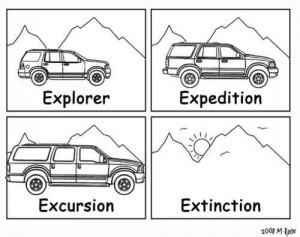Essay by Randy Udall
Wildlife – July 2008 – Colorado Central Magazine
THE COPS SHOT A COUGAR in Chicago this spring. DNA tests suggested the young male may have begun his journey in the Black Hills of South Dakota, 1,000 miles away. If so, he roamed across three big states, looking for love.
Earlier this winter, an automatic camera set up by a biologist photographed a wolverine in a forest north of Lake Tahoe. This was jaw dropping — the first documented wolverine sighting in California in 85 years. Hair samples suggested this vagabond may have come from as far away as Idaho’s Sawtooth Range.
Scientists suspect these pioneers are following stream courses, figuring it out as they go — in much the way Lewis and Clark did, although without the help of Sacagawea. I imagine it’s harder for a cougar to reach Chicago than it is for a climber to summit Everest. Wisconsin is awash in whitetails, but even at today’s lofty gasoline prices Eisenhower’s interstates are a shooting gallery. Try crossing I-10 in Phoenix on foot and you get the idea.
Rare animal sightings make my day. I root for lynx and ivory bills and underdogs. If a wolf walks from Yellowstone to Colorado, I’m going to cheer him on, because it’s a concrete jungle out there.
Most of these lone wayfarers are doomed never to find mates. From a genetic perspective, a wolverine in California is a zombie, one of the walking dead. But these unusual peregrinations may become more common as oil becomes more expensive and driving decreases. Diesel is four bucks headed to five, gasoline is close to four. Pretty soon we may have to sell it by the liter as they do in Europe. All this may play havoc with our driving, but it will sure make life easier for wandering animals.
The West is a vast landscape that cheap oil simultaneously shrunk and inflated. You can drive from Denver to Reno in a long day, but much of the landscape you pass through has never been emptier. Conservation biologists call it the “semi-wild,” and it has a bright future. The semi-wild is not the forest primeval. It’s the land out back where no one goes anymore. Our subdivision in western Colorado borders 1,600 acres of BLM, which is home to scrub oak, sagebrush, abandoned jeep roads, turkey, bear, elk and coyote. There is a small creek where you might find a rusty can, a broken green bottle, a deflated party balloon that drifted in from the town park, an old fire ring, a spent cartridge. This is where kids used to build their forts and shoot 22s. Aging ranchers used to talk about Three Toes, the last griz. Now, sociologists search for the last kid in the woods, a mythological beast about as rare as the yeti.
Today’s kids grow up in cars. A typical American soccer mom drives the distance to the moon every 20 years. But after a century of steady increases, vehicular miles traveled in the United States have leveled off at 3 trillion a year. MasterCard says gasoline sales have recently been down by an astounding 5 percent.
CHEAP OIL is not endangered; it is extinct. From now on, we’re bidding against the Chinese, and by 2010, the strike price may be $180 a barrel, which means gasoline will be $5 a gallon. Diesel might well be $6. That’s a different world for long-distance commuters, airlines, tractor-reliant ranchers and farmers, semi-truck drivers, grocery shoppers, house-boat operators on Lake Powell, and owners of gargantuan RVs. Traffic jams in Glacier National Park might ease, and Las Vegas’s growth may slow. U.S. 50, the “loneliest road in America,” may get lonelier.
Since 1985, we Americans have been consuming forty percent of Mexico’s oil. Most of it is produced at Cantarell, a giant field created by the same asteroid strike that may have killed the dinosaurs. Unfortunately, Cantarell and Alaska’s Prudhoe Bay are well on their way to being spent cartridges. Within a decade, Mexico won’t be exporting any oil. This might mean boom times for a different type of coyote.
More expensive oil could lead to a surge in animal travel, and in fact, it has already begun. Wolves are moving down from Minnesota into a northern Wisconsin made wild again by a stern combination of ticks, black flies and Lyme disease.
So, prowl on young cougar. Your wandering gives me pleasure. To the east lies Illinois, a promised land. As for the last kid in the woods, you go, girl. Peak oil should be good for you, too.
Randy Udall is a contributor to Writers on the Range, a service of High Country News (hcn.org). He is an energy consultant who writes in the Roaring Fork Valley of western Colorado.

